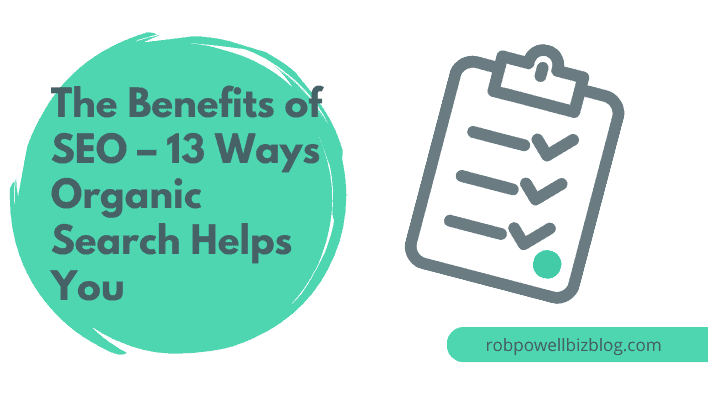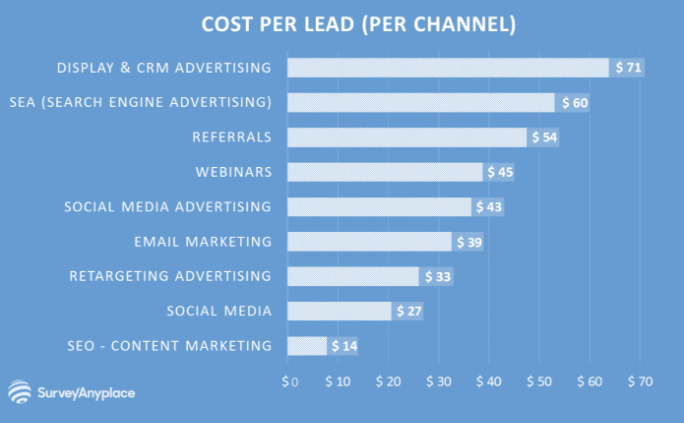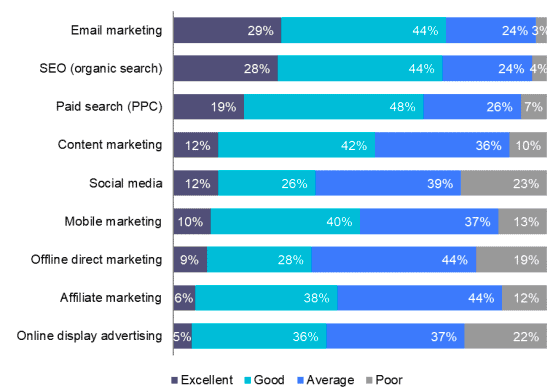The advantages of SEO as a source of traffic are many. Here are 11 reasons why search engine traffic is the best option for growing your online business.
- #1. SEO Targets Quality Traffic
- #2. Gives You a Competitive Edge
- #3. SEO Attracts Targeted Leads
- #4. Results in Higher Conversion Rates
- #5. Boosts Your Credibility
- #6. Helps Build Brand Awareness
- #7. SEO Can Be Measured
- #8. Targets Every Stage of The Buyer Journey
- #9. Leads to Better User Experience
- #10. Builds Your Email List Fast
- #11. Reduces Your Advertising Costs
- #12. Passive Traffic
- #13. Get To Know Your Audience Better
- Conclusion
- More Articles About SEO

#1. SEO Targets Quality Traffic
When people visit search engines 99% of the time they are either looking for information or trying to solve a problem.
And that means that when they type a query into Google and find your web page, they are already interested in what you have to offer.
This means that traffic from Google and other search engines is high quality traffic.
Compare this with conventional advertising, where you attempt to interrupt your target audience with ads that they don’t want to see.
In conventional advertising, your target didn’t ask to see your information: they probably find your ads annoying and most likely they will tune out to them.
But with SEO it’s entirely different: they are actively looking for your information and so they are 10 times more receptive to what you have to offer.
In a nutshell, SEO delivers higher quality traffic than any other channel on the Internet.
#2. Gives You a Competitive Edge
Having your website ranked in the search results for your industry keywords is going to give you an advantage over your competitors.
If two businesses are equal in every other respect, but one has high search engine visibility, which business is going to get more customers?
The one that ranks in the search engines, of course. And this is even more the case as we enter the third year of the pandemic. More and more people going online to do their shopping and solve their problems.
#3. SEO Attracts Targeted Leads
Once you have a piece of content ranked at the top of the search results, just add an opt-in form and a compelling lead magnet, and you have an endless stream of new leads flowing into your funnel.
Not only that, but the leads you get from SEO are of much higher quality than the leads you get from paid ads. The leads from SEO represent people who are actively looking for what your business offers.
And those leads keep coming in, around the clock: once you’ve set it up, there’s nothing more you need to do. It’s lead generation on auto-pilot.
That’s why leads generated from SEO are the most cost-effective. According to research by SurveyAnyplace, leads from SEO content marketing are the lowest cost-per-lead compared to other digital marketing channels:

#4. Results in Higher Conversion Rates
People who find your content in a search engine are actively looking for the kind of solutions you offer. So it should come as no surprise that SEO has much higher conversion rates that conventional advertising.
SmartBugMedia reports that SEO has an average conversion rate of 14.6% compared with an average conversion rate of 1.7% for direct mail and print advertising.
#5. Boosts Your Credibility
Credibility in you and your brand is another of the key advantages of SEO.
People trust the algorithms that search engines use to rank the results on a search query. That’s why the top three results on Google get a massive 75% of all the clicks.
And because people trust the algorithms to give them the best results, it means that when they see your page listed at the top of the search results, you and your website get a huge credibility boost.
#6. Helps Build Brand Awareness
Users may not click on your link in the search results. But the mere fact of seeing your web pages over and over again in Google search creates brand awareness for your website.
SEO and branding are so intertwined that there’s even a term for it: SEO branding.
And because SEO is free, the business of branding through SEO really is a level-playing field. If you can create outstanding content, you can outrank big companies with much bigger budgets than yours (at least for long tail keywords).
#7. SEO Can Be Measured
As Peter Drucker once said: “If you can’t measure it, you can’t improve it”. A huge advantage of SEO is that everything you do can be measured down to the most granular detail.
Landing page performance, top viewed posts, pageviews, organic click-through rate, organic bounce rate, organic conversion rate (by landing page, by location, by device, by browser), top exit pages, and keyword position are just some of a multitude of metrics that can be measured in SEO.
And because you can measure these things, that means you can identify what works and what doesn’t work and constantly improve the performance of your content.
Of course, I should mention here that in measuring your SEO you have at your disposal (completely free of charge) what must be the most advanced and sophisticated analytics platform on the Internet: Google Analytics.

#8. Targets Every Stage of The Buyer Journey
One of the biggest advantages of SEO is that it allows you to make contact with your target audience at every stage in the buyer journey.
Once you understand searcher intent and the different kinds of keywords that correspond to the different stages in the buyer journey (navigational, informational, and transactional) you can create content that will find your potential customers wherever they are in their buyer journey.
This ability of SEO to find your customers at every stage of the conversion funnel is called customer-centric engagement. It stands in sharp contrast to paid advertising which is much less attuned to where your customers are right now.
#9. Leads to Better User Experience
In 2015, Google introduced a machine learning-based algorithm called RankBrain. One of the things that RankBrain does is to measure user satisfaction. In SEO jargon, this is called ‘user experience’ or UX.
Although no one (outside of Google) knows exactly how RankBrain works, it most likely measures user experience by monitoring these four metrics:
- Organic Click-Through-Rate
- Dwell Time
- Bounce Rate
- Pogo-sticking
Organic CTR is the number of clicks you get from your SERP snippet.
Dwell time is the amount of time a visitor spends on your page.
Bounce rate is the rate at which visitors leave your page without visiting any other page on your website or interacting in any way with your page.
And pogo-sticking is what happens when a visitor lands on your page, realizes your page doesn’t answer their query and goes back to the search results to find another page that does answer their query.
To perform well in SEO, your web pages have to perform well, as measured by these four metrics.
So, a by-product of SEO is that you end up with a website that gives your user a better than average user experience.
#10. Builds Your Email List Fast
SEO has the ability to grow your list fast. When people find your web pages in the search engines, they’re looking for information – and very often they want as much information as they can get hold of.
One way to collect email addresses is to offer a downloadable report, checklist, or swipe file that contains more information than your web page offers.
This is called a ‘content upgrade’.
Here’s an example of a content upgrade. Let’s say you publish an article about ‘stop words’ in SEO. And somewhere in the article you offer your readers a list of 500 SEO stop words.
That’s something your readers will most likely want to have. But to get it, they need to provide an email address (because you need somewhere to send it).
If you create powerful lead magnets on every page of your website, each one tailored to the particular content of that page, you have a mechanism for rapidly building your email list.

#11. Reduces Your Advertising Costs
This may seem obvious but it’s worth making the point: the more traffic you get from SEO, the less dependent you’ll be on paid advertising.
Of course, the benefit of SEO is not just that you’ll be spending less on advertising: you also get much better quality leads from SEO than you do from advertising. To put it another way, the leads you get from SEO convert at a much higher rate than they do from paid advertising.
#12. Passive Traffic
Unlike social media or paid advertising, SEO delivers passive traffic.
On social media, a post can last anywhere from a few days to a few seconds. And then it’s gone. And you have to start all over again.
But with SEO, your page will keep sending you traffic months and even years after you first publish it. With SEO, each new piece of content you create builds on your previous content. It’s not like social media, where the content you create disappears into the ether within a few days.
#13. Get To Know Your Audience Better
When people go to a search engine, they have a problem they need to solve. That’s why the keywords that you target in SEO are a window into the problems facing your potential customers.
By doing SEO you get to know your customers and what their challenges are. That means you can serve them better and position your products and services better.
Conclusion
Here again are the thirteen advantages of SEO:
- targets quality traffic
- works for you around the clock, every day of the year
- Brings quality leads
- results in higher conversion rates
- boosts your credibility
- helps establish brand awareness
- can be measured (and therefore improved)
- targets every stage of your buying funnel
- leads to better user experience
- helps build your email list fast
- reduces your advertising costs
- gets more clicks than ppc
- results in mobile-friendly websites
SEO is like an investment – it takes time, but it pays big dividends in the end.
More Articles About SEO
- Search Engine Visibility – 23 Valuable Tips For More Traffic
- Stuck on Page #2 of Google – How To Get Out in 7 Easy Steps
- 13 Types of SEO You Need To Know About in 2022
- SEO Recipe For Success – The 7 Key Ingredients For Ranking Well
- What Is SEO? An Introduction to Search Engine Optimization
- Seven Google SEO Trends To Watch For In 2022
- How To Write SEO Friendly Blog Posts – 17 Important Tips
- SEO Off-Page Techniques: 7 Important Facts You Need To Know
- SEO Acronym & What It Means (+ 7 Proven SEO Techniques)
- SEO for Blog Posts – 15 Factors To Help You Rank Higher
- 19 SEO Mistakes You Should Avoid At All Costs
- Bing Search Engine Stats – Some Interesting Facts & Figures
- Benefits of SEO for Bloggers – 10 Reasons You Need To Be On Page #1